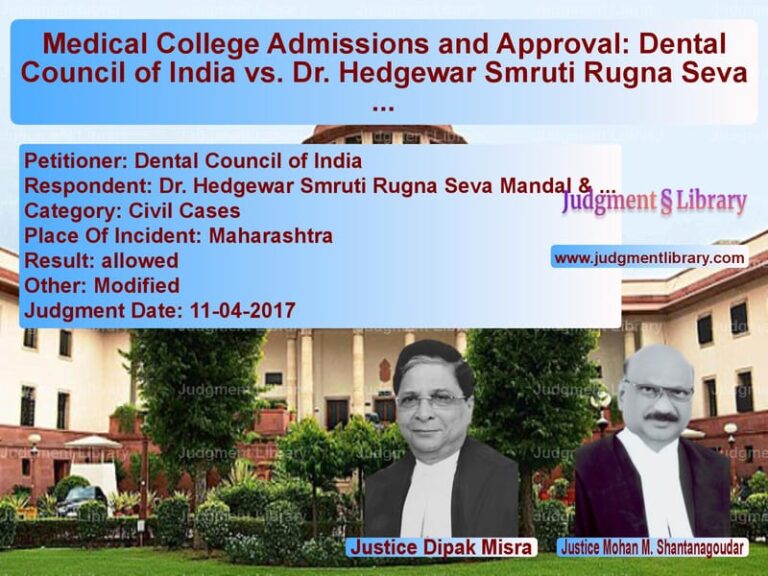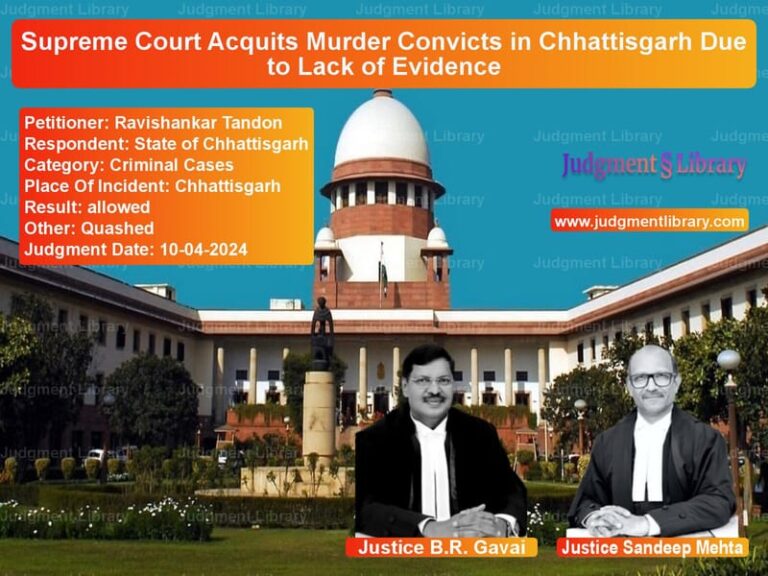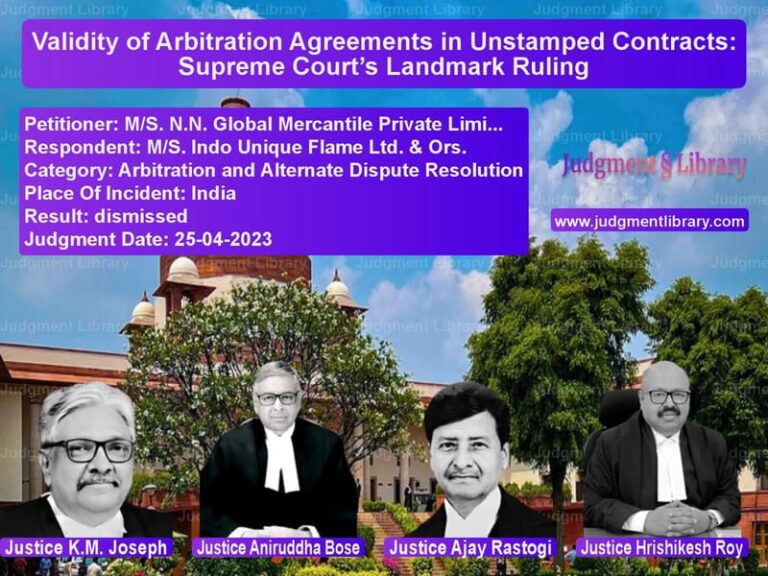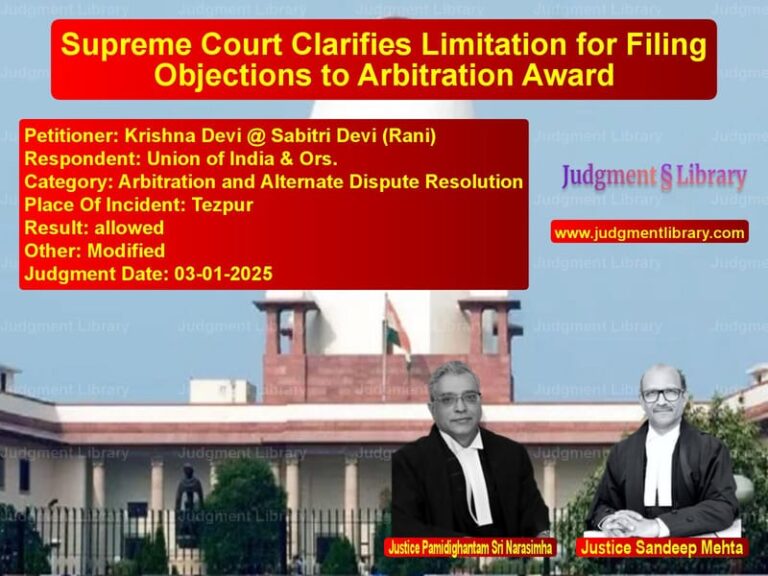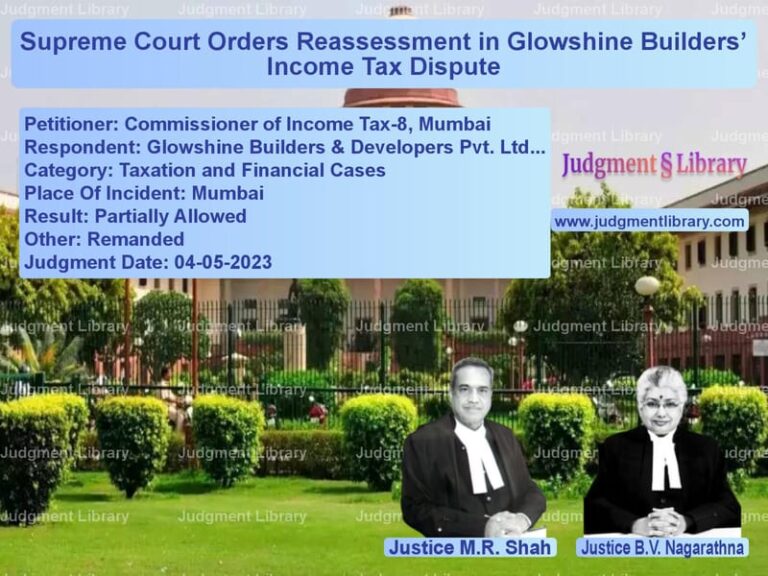Supreme Court Quashes Lokayukta’s Recommendation: No Criminal Proceedings Against Haryana Official
The Supreme Court of India in Ram Kishan Fauji vs. State of Haryana & Ors. examined the legality of a recommendation made by the Haryana Lokayukta for the registration of a criminal case under the Prevention of Corruption Act, 1988. The case revolves around allegations of bribery and corruption in the grant of a Change of Land Use (CLU) license. The Supreme Court ruled that the High Court of Punjab & Haryana had erroneously allowed an intra-court appeal against the quashing of the Lokayukta’s recommendation, stating that such appeals are not maintainable in criminal matters.
Background of the Case
The case began with a reference made by the Chief Secretary, Government of Haryana, under Section 8(1) of the Haryana Lokayukta Act, 2002, requesting an inquiry into allegations of bribery in granting a Change of Land Use (CLU) license. The reference led to a public inquiry, with the Lokayukta issuing notices and seeking material from various government agencies, media outlets, and the public.
Key developments in the case:
- The Lokayukta issued a notice to Ram Kishan Fauji, a senior official, asking for an explanation.
- He responded and provided forensic reports claiming that the audio-visual evidence presented against him was manipulated.
- Despite the submission of forensic evidence, the Lokayukta recommended the registration of an FIR against him under the Prevention of Corruption Act, 1988.
- Ram Kishan Fauji filed a writ petition in the Punjab and Haryana High Court seeking the quashing of the Lokayukta’s recommendation.
Legal Issues Before the Supreme Court
- Did the Haryana Lokayukta have the authority to direct the registration of an FIR?
- Was the intra-court appeal before the High Court maintainable in a matter concerning criminal jurisdiction?
- Should electronic evidence, including a compact disc (CD), be admissible without verification?
Arguments by the Petitioner (Ram Kishan Fauji)
The petitioner challenged the Lokayukta’s recommendation, arguing:
- The Lokayukta did not have the power to order the registration of an FIR.
- The forensic examination had established that the evidence against him was not continuous or authentic.
- The High Court was correct in quashing the Lokayukta’s recommendation.
- The intra-court appeal filed by the State of Haryana was not maintainable under Clause 10 of the Letters Patent as it pertained to criminal jurisdiction.
Arguments by the Respondent (State of Haryana)
The State of Haryana defended the Lokayukta’s recommendation, asserting:
- The recommendation was based on material evidence and credible allegations of corruption.
- The High Court’s judgment was erroneous, and the intra-court appeal was maintainable.
- The Lokayukta had quasi-judicial authority and was justified in recommending an investigation.
- The FIR registered following the Lokayukta’s report was valid and lawful.
Supreme Court’s Observations
The Supreme Court ruled in favor of the petitioner, quashing the intra-court appeal and affirming the High Court’s decision to set aside the Lokayukta’s recommendation. The Court made several key observations:
“Neither the Lokayukta nor Upa-Lokayukta has any jurisdiction or authority to direct implementation of his report, but when after investigation, it is found that a public servant has committed a criminal offense, prosecution can be initiated.”
The Court further stated:
- The Lokayukta’s recommendation could not have been the basis for registering an FIR without proper verification of evidence.
- The High Court was right in treating the matter as one of criminal jurisdiction, and therefore, the intra-court appeal was not maintainable.
- In matters involving criminal jurisdiction, Letters Patent Appeal is not permissible.
Final Judgment
On March 21, 2017, the Supreme Court ruled:
- The appeal by Ram Kishan Fauji was allowed.
- The Punjab and Haryana High Court’s decision allowing the intra-court appeal was set aside.
- The High Court’s order quashing the Lokayukta’s recommendation was upheld.
- The Supreme Court granted liberty to the State to challenge the High Court’s single-judge order through other legal remedies.
Legal Implications of the Judgment
This judgment has important implications for future corruption investigations and judicial review:
- Limits on Lokayukta’s Authority: The Lokayukta can recommend an investigation but cannot direct the registration of an FIR.
- High Court’s Power in Criminal Cases: The ruling affirms that intra-court appeals are not maintainable in criminal jurisdiction cases.
- Electronic Evidence Scrutiny: Courts must scrutinize digital evidence before considering it admissible.
- Judicial Review of Administrative Recommendations: Government officials can challenge Lokayukta recommendations through writ petitions.
Impact on Future Cases
This ruling sets a precedent for handling Lokayukta recommendations:
- State governments must verify corruption allegations before filing FIRs.
- Lokayuktas must act within their statutory limits.
- High Courts must ensure due process in corruption cases.
Conclusion
The Supreme Court’s decision in Ram Kishan Fauji vs. State of Haryana underscores the importance of procedural fairness in corruption cases. It clarifies the limited authority of Lokayuktas, strengthens due process rights for government officials, and reaffirms that intra-court appeals are not maintainable in criminal matters.
Don’t miss out on the full details! Download the complete judgment in PDF format below and gain valuable insights instantly!
Download Judgment: Ram Kishan Fauji vs State of Haryana and Supreme Court of India Judgment Dated 21-03-2017.pdf
Direct Downlaod Judgment: Direct downlaod this Judgment
See all petitions in Fundamental Rights
See all petitions in Public Interest Litigation
See all petitions in Separation of Powers
See all petitions in Judgment by Dipak Misra
See all petitions in Judgment by A M Khanwilkar
See all petitions in Judgment by Mohan M. Shantanagoudar
See all petitions in allowed
See all petitions in Quashed
See all petitions in supreme court of India judgments March 2017
See all petitions in 2017 judgments
See all posts in Constitutional Cases Category
See all allowed petitions in Constitutional Cases Category
See all Dismissed petitions in Constitutional Cases Category
See all partially allowed petitions in Constitutional Cases Category


